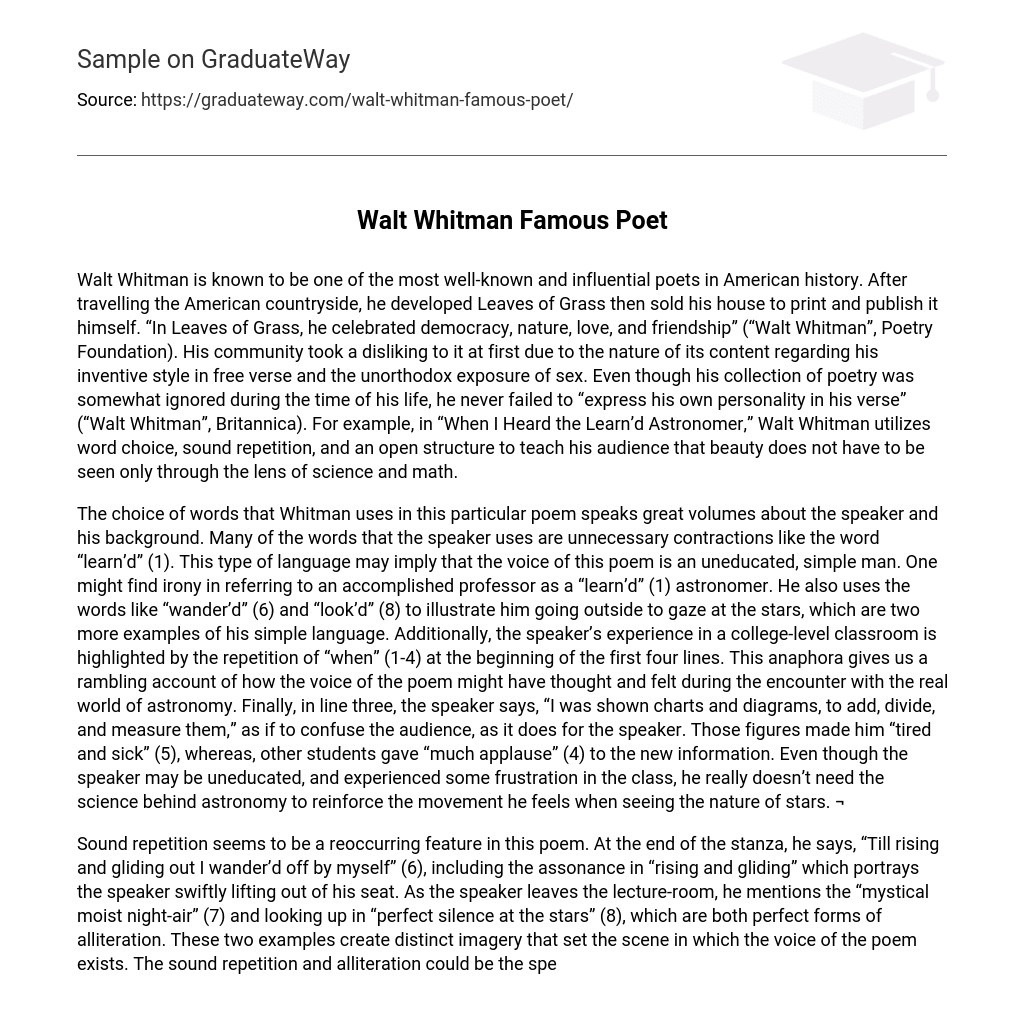Walt Whitman is known to be one of the most well-known and influential poets in American history. After travelling the American countryside, he developed Leaves of Grass then sold his house to print and publish it himself. “In Leaves of Grass, he celebrated democracy, nature, love, and friendship” (“Walt Whitman”, Poetry Foundation). His community took a disliking to it at first due to the nature of its content regarding his inventive style in free verse and the unorthodox exposure of sex. Even though his collection of poetry was somewhat ignored during the time of his life, he never failed to “express his own personality in his verse” (“Walt Whitman”, Britannica). For example, in “When I Heard the Learn’d Astronomer,” Walt Whitman utilizes word choice, sound repetition, and an open structure to teach his audience that beauty does not have to be seen only through the lens of science and math.
The choice of words that Whitman uses in this particular poem speaks great volumes about the speaker and his background. Many of the words that the speaker uses are unnecessary contractions like the word “learn’d” (1). This type of language may imply that the voice of this poem is an uneducated, simple man. One might find irony in referring to an accomplished professor as a “learn’d” (1) astronomer. He also uses the words like “wander’d” (6) and “look’d” (8) to illustrate him going outside to gaze at the stars, which are two more examples of his simple language. Additionally, the speaker’s experience in a college-level classroom is highlighted by the repetition of “when” (1-4) at the beginning of the first four lines. This anaphora gives us a rambling account of how the voice of the poem might have thought and felt during the encounter with the real world of astronomy. Finally, in line three, the speaker says, “I was shown charts and diagrams, to add, divide, and measure them,” as if to confuse the audience, as it does for the speaker. Those figures made him “tired and sick” (5), whereas, other students gave “much applause” (4) to the new information. Even though the speaker may be uneducated, and experienced some frustration in the class, he really doesn’t need the science behind astronomy to reinforce the movement he feels when seeing the nature of stars. ¬
Sound repetition seems to be a reoccurring feature in this poem. At the end of the stanza, he says, “Till rising and gliding out I wander’d off by myself” (6), including the assonance in “rising and gliding” which portrays the speaker swiftly lifting out of his seat. As the speaker leaves the lecture-room, he mentions the “mystical moist night-air” (7) and looking up in “perfect silence at the stars” (8), which are both perfect forms of alliteration. These two examples create distinct imagery that set the scene in which the voice of the poem exists. The sound repetition and alliteration could be the speaker’s way of emphasizing how strong his feelings are for the beauty of space.
Whitman is famous for essentially giving life to the realm of free verse poetry. This structure, lacking meter or rhyme, can be quite telling of how the character may be feeling in this poem. Lines 1 to 4 get increasingly longer as the professor goes about his intense lesson plan which may correspond to the speaker growing more “tired and sick” (5). In lines 5 to 8, the lines become shorter as if to reflect the speaker walking outside to take a breath and realizing the simplicity of the stars. The first line, “When I heard the learn’d astronomer,” and the last line, “Look’d up in perfect silence at the stars” appear to be the same length
Whitman composes the poem in free verse without the confines of structured poetry, like the student expresses their admirability of stars without looking through the optics of science.





